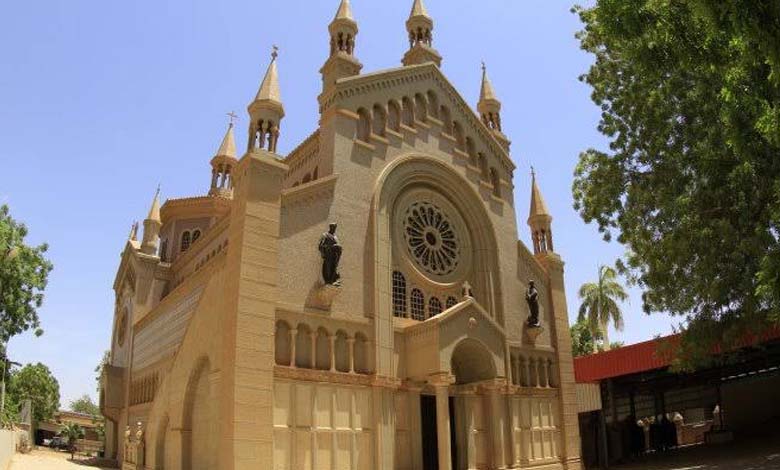Amidst the Fires of War… Story of 80 people trapped inside a church in Khartoum

Amidst fierce battles between the Sudanese army and the Rapid Support Forces, around 80 people sought refuge in a church in the Shagara neighborhood of the Sudanese capital, Khartoum, finding themselves trapped under heavy gunfire, suffering from hunger and a lack of supplies.
Father Jacob Thlikadan, trapped at the “Dar Maryam” Catholic center, is suffering from severe hunger and has lost weight due to food shortages. The center houses dozens of women and children to protect them from the fierce fighting in the streets of Khartoum, according to Reuters.
The roof of the church’s main building was damaged by shells, and parts of the nuns’ residence caught fire.
Facing food shortages, the nuns boil tree leaves for the children to eat, while adults struggle to find enough to eat.
An attempt by the Red Cross to evacuate them last December resulted in the deaths of 2 people and injuries to 7 others, including 3 charity workers, as armed men opened fire on the convoy, forcing it to turn back before reaching the center, where both sides accused each other of responsibility for the attack.
Thlikadan said he and the nuns had refused offers from the army to permanently transfer them across the river, leaving their families behind, preferring to leave with the people.
Many residents of the Sudanese capital fled after the conflict erupted in April last year, spreading to Khartoum and the cities of Bahri and Omdurman on the Nile, before quickly expanding to other parts of the country.
Thlikadan said, “Our food situation is extremely bad… We all feel very weak.”
Severe hunger prevails in the conflict-ridden areas of Sudan, prompting warnings of famine in regions including Khartoum.
Some families sought refuge at the center in June last year, hoping for protection under a concrete roof.
Thlikadan said the area quickly became isolated with pressure from the Rapid Support Forces to take control of the strategic armored battalion headquarters about two kilometers from the Catholic center, among several military bases targeted.
The Shagara neighborhood is under intense attack by the Rapid Support Forces, and the names of those who have enough money among the nearby residents are registered with the army to be transferred to the other side of the Nile, with some waiting for months.
Thlikadan said nighttime evacuation by boat across the White Nile tributary was extremely dangerous for the children sheltering at the center.
Sudan’s war triggered the world’s largest displacement crisis and forced nearly 10 million people to seek shelter inside or outside the country, according to the International Organization for Migration, also causing unprecedented destruction to the capital, Khartoum.
Thlikadan mentioned that the numbers fluctuated, but since March, there have been about 30 women alongside 50 children aged between 2 and 15 at the center.
Most residents of the center are Christian refugees from South Sudan and Ethiopia, who have erected tents made of plastic sheets around the complex buildings including a church, an educational center, and a residential building.
Thlikadan and the nuns have turned most of the safest rooms in the place into a refuge to protect children from gunfire exchanges. They try to distract children from the violence around them by allowing them to ride bicycles in the courtyard and encouraging them to engage in video games.
Food remains a challenge, and by September, money started running out and it became nearly impossible to procure supplies from markets in the area due to clashes.
Children typically received small amounts of porridge, lentils, and beans, but stocks have dwindled significantly.
Thlikadan said that since February, forces at the armored camp had airlifted aid to Dar Maryam, including sugar and fuel for water-pumping generators from wells.
The army also facilitated communication via Starlink to allow those in the complex to use their phones and twice transported the priest and an administrative official to Port Sudan, a city on the Red Sea where the army and government relocated, to meet with church officials and collect funds and supplies.












